Nestled in the heart of Kyoto, Japan’s cultural capital, a centuries-old tradition awaits those seeking a moment of tranquility. The Zen tea ceremony, or Chado, invites visitors to enjoy the meticulous preparation and appreciation of matcha tea. Guided by a certified tea instructor, guests will embark on a sensory journey, sampling exquisite teas and savoring delicate Japanese confections. This intimate experience not only illuminates the nuances of Japanese culture but also fosters a deeper connection to the present moment.
Key Points
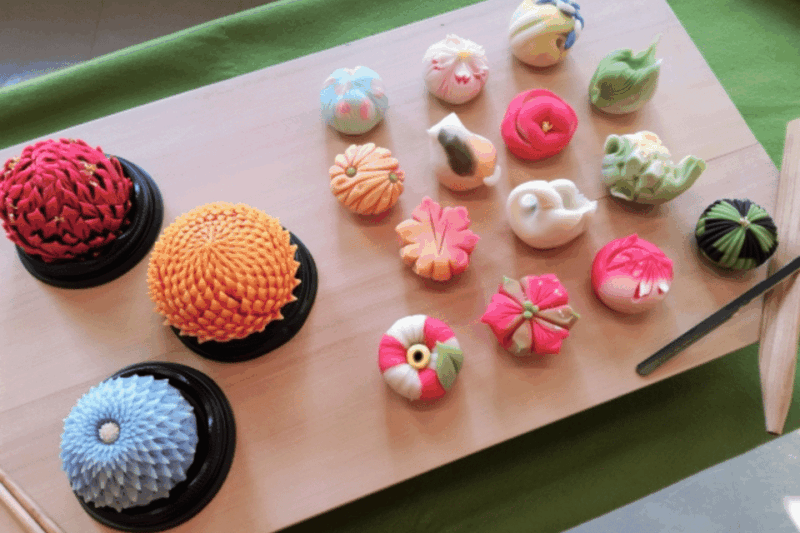
- Immerse in a 45-minute traditional Japanese tea ceremony led by an English-speaking instructor, offering a mindful and artistic experience in an intimate setting.
- Discover the cultural significance of Chado, the Way of Tea, deeply rooted in Zen Buddhism and reflecting principles of harmony, respect, purity, and tranquility.
- Observe and participate in the meticulous preparation of matcha tea, savoring the rich aroma and flavor while guided by the instructor.
- Sample a variety of Japanese green teas, including gyokuro, sencha, and hojicha, each with distinct flavor profiles.
- Indulge in traditional Japanese confections, known as wagashi, that complement the matcha tea and showcase seasonal ingredients and symbolic meanings.
Experience Overview
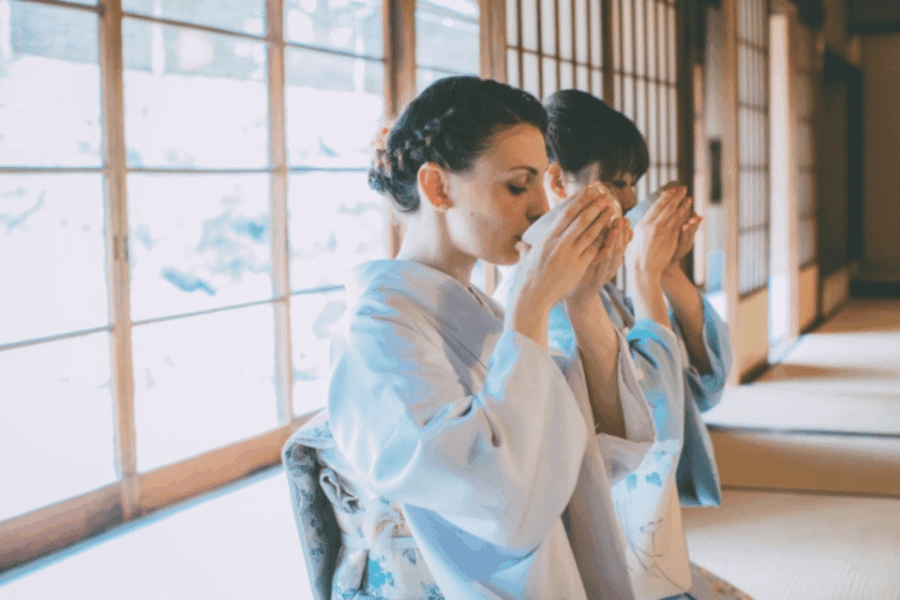
The traditional tea ceremony in Kyoto offers a unique cultural experience that lasts approximately 45 minutes.
Participants are limited to a small group of 8, ensuring an intimate setting. An English-speaking instructor guides them through the ceremony, providing insights into the spiritual and cultural significance of Chado, the ancient Zen tea tradition.
With a free cancellation policy and a reserve now, pay later option, the experience is both accessible and flexible.
Whether admiring the room’s decor or practicing the art of serving tea, guests are immersed in the mindfulness and artistry that defines this centuries-old Japanese ritual.
Here are more great tours and experiences we've reviewed in Kyoto
Cultural Significance of Chado
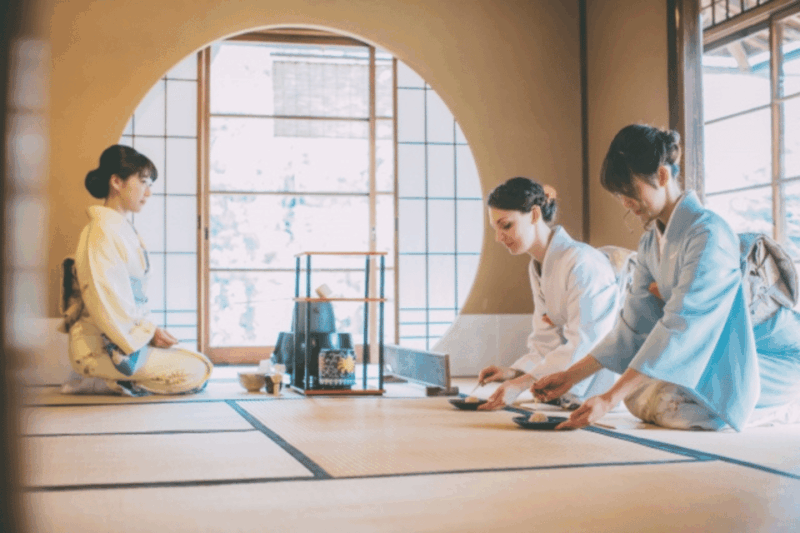
Chado, the ancient Japanese tea ceremony, holds immense cultural and spiritual significance.
It’s deeply rooted in Zen Buddhism, emphasizing mindfulness, discipline, and the appreciation of the present moment. The meticulously choreographed steps of preparing and serving tea reflect the principles of harmony, respect, purity, and tranquility.
The room’s decor and layout are strategically designed to create a serene, contemplative atmosphere. From the selection of utensils to the way tea is whisked, every action is imbued with symbolic meaning.
Partaking in Chado isn’t just about drinking tea, but engaging in a profound, meditative experience that nourishes the mind and soul.
Preparing Matcha Tea
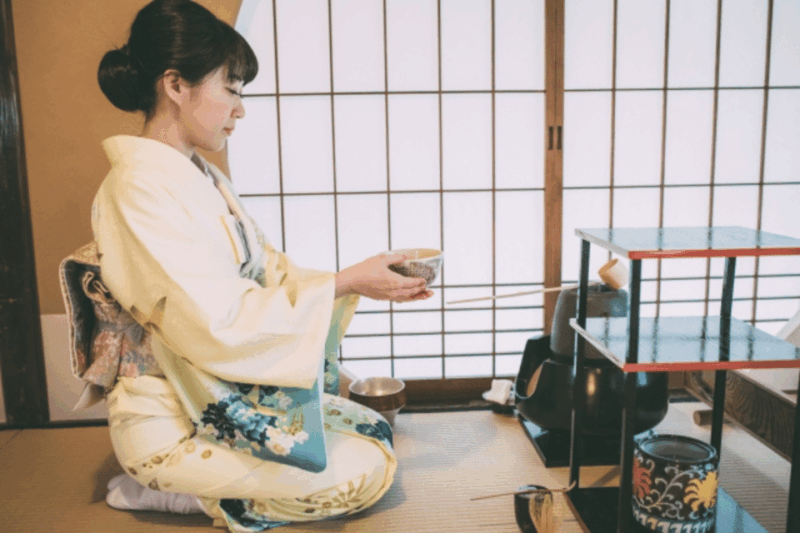
After the instructor provides a brief overview of the tea ceremony’s cultural significance, participants eagerly take their places around the low table in the serene tea room.
The instructor demonstrates the meticulous steps of preparing matcha tea. Participants observe as the instructor carefully scoops the vibrant green powder into a lacquered bowl, adding hot water, and then whisking the mixture with a bamboo whisk until it froths.
Each person is then given the opportunity to prepare their own bowl of matcha, guided by the instructor’s watchful eye. The rich, earthy aroma fills the air as everyone savors the perfectly crafted matcha tea.
Sampling the Teas
With their matcha tea prepared, participants eagerly sample the various teas presented before them.
The tea instructor introduces each type, explaining its distinct flavor profile and aroma.
First, they savor a rich, umami-forward gyokuro green tea.
Next, a delicate sencha green tea delights the palate with its fresh, grassy notes.
Finally, they indulge in a robust, complex hojicha – a roasted green tea with caramelized undertones.
As participants switch between the teas, they note the nuanced differences, deepening their appreciation for the art of tea appreciation.
More Great Thing To Do NearbyEnjoying Japanese Confectionery
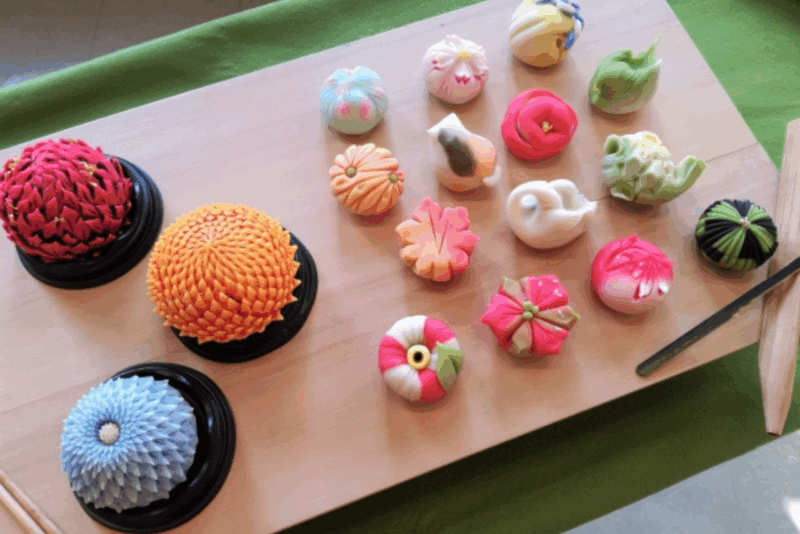
Participants are next presented with an array of traditional Japanese confectioneries, known as wagashi.
These delicate sweets are carefully crafted to reflect the changing seasons and often feature natural ingredients like red bean paste, rice flour, and seasonal fruits.
The instructor explains the symbolic meanings behind each wagashi, noting how their shapes and flavors evoke the essence of spring, summer, autumn, or winter.
Guests reverently sample the confections, savoring their subtle sweetness and admiring their exquisite artistry.
The wagashi beautifully complement the matcha tea, creating a harmonious sensory experience that embodies the essence of Japanese cultural refinement.
The Spiritual and Mindful Aspects
The tea ceremony is deeply rooted in the principles of Zen Buddhism, reflecting the spiritual and contemplative nature of the practice.
Through the carefully choreographed movements and precisely measured preparations, participants are encouraged to enter a state of mindfulness, focusing their full attention on the present moment.
The tea ceremony emphasizes:
- Mindfulness – Cultivating awareness and presence during each step of the tea-making process.
- Simplicity – Embracing minimalism in the room’s decor and utensils to avoid distractions.
- Harmony – Maintaining a balanced and harmonious atmosphere throughout the ritual.
This immersive experience allows participants to disconnect from the outside world and connect with the timeless traditions of Japanese culture.
Guidance From a Certified Tea Instructor
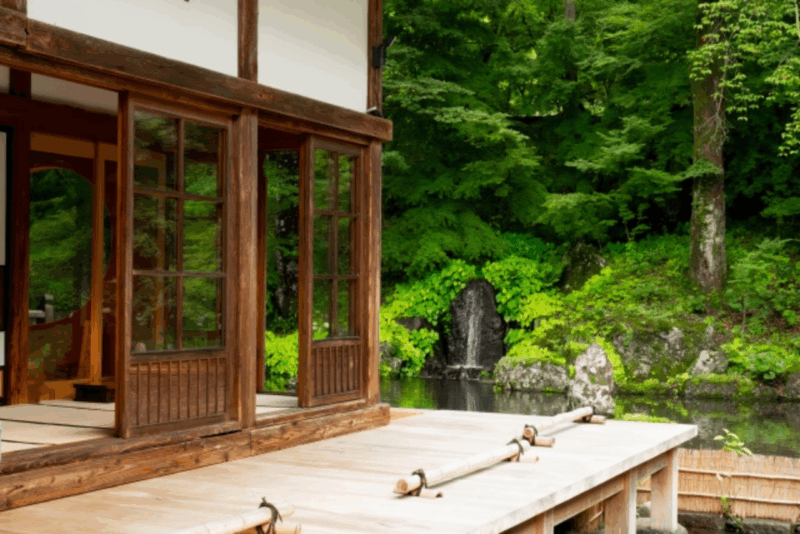
Although the tea ceremony may appear highly ritualized, participants benefit from the guidance of a certified tea instructor throughout the experience. The instructor explains the significance of each step, from preparing the matcha powder to the proper handling of the tea bowl. Participants have the opportunity to practice serving tea as both the host and guest, under the instructor’s watchful eye.
| Instructor Guidance | Benefits to Participants |
|---|---|
| Explains tea ceremony significance | Learn proper tea preparation techniques |
| Demonstrates host and guest roles | Practice serving tea as host and guest |
| Provides feedback on participant actions | Develop tea ceremony skills and etiquette |
| Answers questions about customs and traditions | Gain deeper appreciation for tea ceremony |
[NEXT SUBTOPIC]:
Admiring the Tea Room Decor
Booking and Reservation Details
Flexible booking options are available for the Zen Tea Ceremony in Kyoto.
Participants can conveniently check availability and select their preferred starting time. The meeting point is provided on Google Maps, making it easy to find the tea room location.
Guests can reserve their spot now and pay later, providing flexibility in planning their Kyoto experience.
- Availability checks and start time selection
- Google Maps meeting point for hassle-free arrival
- Reserve now, pay later option for convenient booking
Frequently Asked Questions
Can Participants Bring Their Own Tea Utensils?
No, participants cannot bring their own tea utensils. The tea ceremony is conducted using traditional Japanese tea ware provided by the instructor. Bringing personal items would disrupt the ceremonial experience and flow.
Is There a Dress Code for the Tea Ceremony?
There is no formal dress code, but participants are encouraged to wear smart casual attire. Avoiding overly casual or revealing clothing is recommended to show respect for the traditional tea ceremony.
Are There Any Dietary Accommodations for the Sweets?
The tea ceremony offers dietary accommodations for the sweets. Participants can let the instructor know of any dietary restrictions or preferences, and alternative options will be provided to accommodate individual needs.
Can the Experience Be Customized for Private Events?
Yes, the experience can be customized for private events. Organizers can request adjustments to group size, schedule, and menu items to accommodate specific needs or preferences. Flexibility is available to create a personalized Zen tea ceremony.
What Is the Cancellation Policy if Plans Change?
The tea ceremony experience offers free cancellation with a full refund if canceled 24 hours in advance, providing flexibility in case plans change. The booking is also flexible, allowing customers to check availability and select their preferred date.
The Sum Up
The Zen tea ceremony in Kyoto offers a tranquil and immersive experience that allows you to fully appreciate the art of Chado. Under the guidance of a certified tea instructor, you’ll learn the meticulous preparation of matcha, sample an array of exquisite teas, and savor traditional Japanese sweets, all while cultivating a mindful and spiritual connection with Japanese culture.
You can check if your dates are available here:More Dessert Tours in Kyoto
More Tour Reviews in Kyoto
- The Art of Geisha: Exclusive Show & Traditional Japanese Game
- Tea Ceremony With Kimono and Professional Photoshoot in Kyoto
- Kyoto Arashiyama Bamboo Forest Hidden Hiking Tour
- Kyoto Early Morning Walking Tour: Nature & History
- Small-Group Dinner Experience in Kyoto With Maiko and Geisha
- Private Kyoto Night Tour: Historic Walk at Gion and Fushimi
Not for you? Here's more things to do in Kyoto we have recnetly reviewed
- 5 Best Cruises And Boat Tours In Kyoto
- 14 Best Dining Experiences In Kyoto
- 20 Best Full-Day Tours In Kyoto
- 5 Best 2 Day Tours In Kyoto
- 2 Best 4 Day Tours In Kyoto
- 20 Best Photography Experiences In Kyoto
- 13 Best Dinner Tours In Kyoto
- 25 Best Food Tours In Kyoto
- 14 Best Lunch Experiences In Kyoto
- Kyoto Bus Tour: Iconic KInkakuji, Ginkakuji, Kiyomizu Temple (AW)
- Kyoto Bus Tour: Arashiyama, Kinkaku-ji Review
- Gyoza Cooking Class in Kyoto: Traditional Japanese Dumplings
